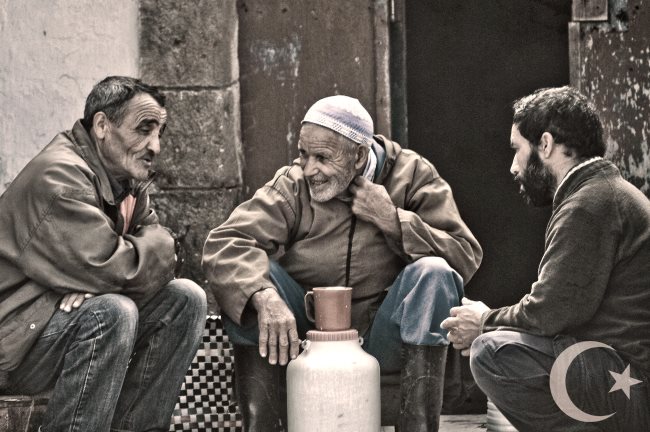
The Father, The Son, and The Holy Bean
Black because the satan, sizzling as hell, pure as an angel, candy as love.
-Charles Maurice de Talleyrand, French Diplomat
Have you ever ever taken a sip of your favourite brew, tilted your head upwards to the heavens, closed your eyes, and exclaimed, “God, that’s good espresso!”?
When you’ve got, you might be among the many hundreds of thousands and hundreds of thousands of individuals from all faiths and perception methods who solely imagine in God due to espresso. Take away the miracle of the espresso bean and these individuals would both turn out to be agnostics or atheists. And all of them could be sleepy.
In any case, espresso for many individuals is faith. We worship it in many alternative types, and we exult it by way of rituals and customs; the Grinding of the Bean, the Sacrament of the Pour Over, the Vow of Silence (till you’ve had not less than three sips).
We proselytize and unfold the Good Information concerning the coming of Intelligentsia to our neighborhoods. We share tales concerning the miracle of the “Ethiopia Kayon Mountain Pure” and the wonders of “Sumatra Boru Batak.”
But, whereas we all know rather a lot about espresso, we’ve just about no information of how main religions view it. What do our monks and pastors and rabbis and mullahs and gurus consider the attractive elixir? And do they drink it?
Historical past, like Sean Spicer, supplies a lot of the solutions.

Islam
Lots of of years earlier than journey bans and ISIS had been invented, espresso turned very a lot in demand within the Arab world. It began with these browsing Sufis in southern Arabia who began brewing the stuff within the thirteenth century. Sheik Abu’l Hasan ‘Ali ibn Umar, or “Skippy” to his mates, traveled to Ethiopia and found the espresso tradition there, so he determined to convey it again residence to Yemen. As a result of it offered “wakefulness” throughout late night prayer, espresso turned highly regarded. “Allah Akhbar! We love our espresso!”
Quickly after, even with out social media, the phrase unfold all through the Islamic world and qahwa was being consumed all over the place, even on the holiest mosques in Mecca. It was affectionately referred to as “Islamic wine.”
The southern Arabian local weather was excellent for espresso cultivation, and the ports of Yemen turned the world’s main exporters of espresso. Many fortunes had been constituted of espresso exports, wealth that rivaled the cash made by Howard Schultz. (It’s rumored, by me, that the star in Starbucks is a tribute to the Islamic star.)
Mystic theologian and coffee-phile Shaikh ibn Isma’il Ba Alawi of Al-Shihr, or “Shorty” as his mates referred to as him, asserted that the usage of espresso earlier than prayer might result in the expertise of qahwa ma’nawiyya or “one kick-ass trippy non secular expertise.”
Merchants, pilgrims, and college students traveled all through the area extolling the virtues of consuming espresso and, positive sufficient, espresso homes sprung up in your complete main cities, particularly Cairo. Sadly, few of them provided free WiFi.
However not everybody embraced the bean juice and all through the later centuries within the Arab world, there have been makes an attempt to make espresso verboten. These efforts had been often thwarted, nonetheless, as a result of even non secular leaders had been hooked.
Espresso prevailed. Reward Allah!

Judaism
The connection between espresso and Judaism runs deep and infrequently parallels what was taking place within the Arab world. Non secular devotion drove its preliminary recognition; the later you possibly can keep awake, the extra you possibly can inform God that you just like him rather a lot.
And since it’s deemed “kosher” (except your espresso has chunks of pork swimming in it), espresso turned widespread with the Jews in cities like Damascus, Cairo, and Constantinople. (FYI: Now it’s Istanbul, not Constantinople.) The truth is, the primary espresso home opened in Constantinople a lot to the delight of the He-Brews (sorry, I couldn’t assist myself).
In 1632, it was a Jewish man who opened the primary espresso home in Europe, in Livorno, Italy. Eighteen years later, a Sephardic Jew, charmingly referred to as “Jacob the Jew,” based the primary espresso home in Oxford, England. Many Sephardic Jews turned espresso merchants throughout this era and introduced the espresso home thought to France and the Netherlands.
After all, the place Jews prosper, antisemitism rears its ugly head. In Germany (shock!), there have been makes an attempt to shut down the Jewish espresso commerce as a result of espresso was threatening their beer business. However espresso, because it all the time does, prevailed.
By the 1800s, espresso homes in Berlin, Vienna, Budapest, and Prague had been on the forefront of social change. Vienna’s café tradition flourished as Jewish students, writers, and artists would order their coffees, sit down, and speak politics and literature and 100 different matters for hours. The espresso home was the place to be seen and heard.
In nineteenth century America, Jewish merchants started working from seaport cities equivalent to San Francisco, New Orleans, and New York. The New York market was very significantly aggressive, and fortunes had been made by males equivalent to Samuel Schonbrunn who produced the high-quality Savarin model served on the Waldorf-Astoria, and William Black, whose nuts retailers turned Chock Full o’ Nuts espresso retailers.
At present, the aforementioned Howard Schultz carries on the nice Jewish custom of the espresso home along with his 20,737 shops in 63 nations and territories. Oy gevalt!

Christianity
Espresso and Christianity. A match made in Heaven. Exclamations like “Jesus Christ, this espresso is nice!” will be heard in all elements of the world each single day.
Biblical students know that Jesus by no means drank a cup of espresso himself, however there’s hypothesis that he did foresee its energy throughout his Sermon on the Mount when he mentioned, “Blessed are the sleepless for they’ve drunk from the cup of Joseph.” May ‘cuppa Joe’ be far behind?
When you’ve ever gone to church or church conferences, espresso looms important. After providers, teams of worshippers usually collect in church basements to get pleasure from a cuppa. Whereas most Evangelicals frown upon liquor, Baptists and Methodists and Lex Lutherans can all agree that espresso is a real blessing.
Nonetheless, the street to caffeinated bliss was oft-times bumpy. Again within the sixteenth century, a gaggle of java-hating monks petitioned Pope Clement VIII to ban what they referred to as “the satan’s drink.” the ‘satan’ half a slap within the face to all Muslims.
“Not so quick,” proclaimed the Pope. So, he had a cup of espresso dropped at him. After his seventh cup and a Danish, outdated Clement leaped out of his Pope chair and exclaimed, “Why, this Devil’s drink is so scrumptious that it might be a pity to let the infidels have unique use of it. We will cheat Devil by baptizing it.”(true story)
And, for espresso drinkers, it simply stored getting higher. Right here’s an anecdote I discovered:
In 1683, a Franciscan friar named Marciano d’Aviano stopped a Turkish invasion of Austria, and alongside the best way, some declare invented the cappuccino. The retreating Turks left behind baggage of espresso beans, historians say, which the Viennese discovered so bitter that they added milk and sugar, making a frothy, candy beverage. Legend says the phrase “cappuccino” comes from d’Aviano’s Capuchin order, so named for his or her brown robes.
Ergo, the phrase “Frappuccino” should be named after Capuchin friars.

Mormonism
Mormons don’t drink espresso. This matter is roofed in better element within the INeedCoffee article Why Mormons Don’t Drink Espresso or Tea.

Faith and Espresso
As you may see, faith and occasional go collectively like soup and a sandwich. Besides, we’re speaking about espresso. So, the following time you may have a spiritual expertise whereas consuming your favourite brew, consider the historical past that went into it. If not for some adventurous Sufi man again within the thirteenth century, you is likely to be sitting there sipping a heat cup of… tea.
Heaven forbid!
Sources
Espresso: The Wine of Islam – by Kathleen Seidel
The Stimulating Story of Jews and Espresso – by Eileen Lavine
Father, Son and Holy Roast: How espresso turned Christians’ acceptable vice – by Laura Turner
Photographs courtesy of Free Vary Inventory
